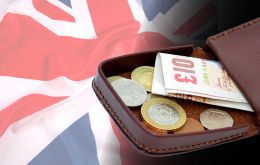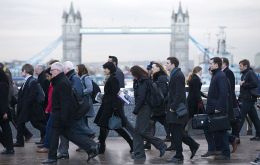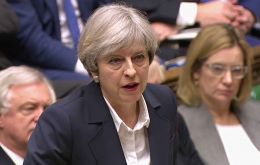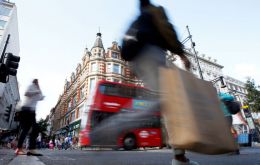MercoPress. South Atlantic News Agency
Tag: UK economy
-
Wednesday, July 5th 2017 - 07:30 UTC
Britain's growth prospects downgraded because of “newly created uncertainty”

Economists have downgraded Britain’s growth prospects in the wake of political uncertainty following the general election and as a prolonged Brexit drag on business investment looms. New forecasts by the Centre for Economics and Business Research (Cebr) show that the UK economy will grow by just 1.3% in 2017, a substantial downward revision from an earlier forecast of 1.7%.
-
Friday, May 26th 2017 - 08:02 UTC
UK economy losing momentum as Brexit impact begins to be felt

Britain's economy slowed more sharply than first thought in early 2017 as consumers felt the hit from the rise in inflation that followed the Brexit vote and exporters struggled to benefit from the weak pound. Thursday's downbeat official data - which contrasts with signs of acceleration in many other economies - comes two weeks before Britons vote in a national election.
-
Thursday, April 20th 2017 - 03:00 UTC
How effectively has the strong UK economy delivered? May and Corbyn debate

How strong is the UK economy? The issue was debated between Theresa May and opposition leader Jeremy Corbyn during Prime Minister's Questions in the House of Commons shortly before the Wednesday vote confirming the June 8 election.
-
Tuesday, April 11th 2017 - 15:30 UTC
UK on the verge of an export and spending boom, anticipates the EY Item Club

Britain is on the verge of an export and spending boom as economists rule out the likelihood of a slowdown this year. Strong global growth combined with the weak pound is expected to send overseas sales soaring, giving businesses the confidence to ramp up investment.
-
Thursday, April 6th 2017 - 14:59 UTC
UK services sector grows stronger than expected during March

Activity in the UK's dominant services sector rose at a faster-than-expected pace in March. The Markit/CIPS purchasing managers' index (PMI) for services rose to 55, compared with economists' expectations of a slight increase to 53.5. The services sector, which accounts for three-quarters of the UK economy, said business activity and new work grew at the strongest rate so far this year.
-
Friday, March 17th 2017 - 07:15 UTC
Bank of England cautiously leaves interest rates at the record low of 0.25%

The Bank of England (BOE) held interest rates at the record low level of 0.25% and maintained asset purchases at £435 billion on Thursday. The decision, which was made by an 8-1 majority, had been almost unanimously anticipated by central bank watchers with many expecting the BOE to choose caution until more clarity emerges on the Brexit process and the U.K. economy's capacity to manage outside of the European Union.
-
Saturday, January 28th 2017 - 12:00 UTC
Consumer spending helps UK economy surprise and grows faster than expected in 2016

Strong consumer spending helped the UK's economy to grow faster than expected at the end of last year. The economy grew by 0.6% in the October-to-December period, the same rate as in the previous two quarters, according to an initial estimate from the Office for National Statistics.
-
Friday, August 5th 2016 - 12:07 UTC
UK admits economy contraction and announces a bold package of stimulus measures

The Bank of England has unveiled a series of stimulus measures in the wake of Brexit, including its first interest rate cut since the global financial crisis (2009), as it tries to jumpstart an economy shocked by Britain’s vote to leave the European Union.
-
Saturday, June 25th 2016 - 11:34 UTC
Ambassador Lyster-Binns confident the UK economy is large and strong

United Kingdom´s Leave victory did not come as a great surprise, since the race was too tight, but that was the decision of the people and the economy is large and strong, admitted British ambassador in Uruguay, Ben Lyster-Binns, in a television interview.
-
Wednesday, April 20th 2016 - 06:15 UTC
Bank of England says it has a duty to talk about the Brexit referendum

It is the Bank's duty to talk about the European Union referendum risks, argues the Bank of England governor Mark Carney, dismissing accusations the Bank is too political. The referendum takes place on 23 June and has become highly controversial.
